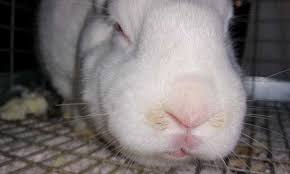

If your rabbit is suffering from the snuffles, you may notice him develop watery eyes, a runny nose and sneezing often. This is typically caused by an infection of his tear ducts or nasal sinuses. Due to the symptoms being generalized, it may be somewhat difficult to identify what your rabbit’s concern is. His symptoms may mimic other conditions rabbits can suffer from such as respiratory diseases, dental concerns or a poorly ventilated hutch. If this infection is left untreated it can result in abscesses, blindness, and can travel to your rabbit’s ears, eyes, reproductive organs and other organs. It is important to be vigilant about getting him to the veterinarian quickly if you suspect snuffles.
The snuffles are caused by the bacterium pasteurellosis, which your rabbit may have in his own body or encounters. It presents as a runny nose, watery eyes and sneezing. This is relatively common and not typically life threatening.
Symptoms of Snuffles (Pasteurellosis) in Rabbits
Most of the symptoms identified will be general to multiple conditions, however below are some things to look for.
Runny eyes – tear ducts can become clogged resulting in even more discharge
Runny nose
Sneezing Head tilting – due to neurological damage,Your rabbit may develop a head tilt
Skin sores
Matted fur -Your rabbit may rub his runny nose and that discharge mats the fur on his paws
Causes of Snuffles (Pasteurellosis) in Rabbits
The cause of the snuffles in this case is contact with the bacterium pasteurellosis. This is a bacterium that naturally occurs in rabbits, however it can turn into a problem. Due to this bacterium being so highly contagious, it is easy for rabbits to spread the infection to one another. While some rabbits are immune to this bacterium, there is still a large amount that are not.
Diagnosis of Snuffles (Pasteurellosis) in Rabbits
If you suspect your rabbit may have a case of the snuffles, a visit to his veterinarian will most likely be in order. It will be important to share with your veterinarian what signs and symptoms you have noticed and for how long. The veterinarian may want to know if your rabbit has been around other animals who appeared to be sick or have similar symptoms. A physical exam will most likely be performed to identify any obvious reasons for his snuffles. Your veterinarian will want to rule out diet and housing as possible culprits for his symptoms as well. Further tests may be requested including bloodwork and samples of any discharge. These tests will confirm if pasteurella is the cause of your rabbit’s problems or not. At times the veterinarian may attempt to make a diagnosis based solely on history and physical, however that will not guarantee your veterinarian identified the correct bacteria. X-rays and other imaging tools may be utilized as well to determine if there are any other possible symptoms of the bacteria.
Treatment of Snuffles (Pasteurellosis) in Rabbits
Treatment will begin with antibiotics to treat the bacterial infection. These medications can be administered for up to a few months to fully treat the infection. Certain antibiotics can be dangerous for rabbits, so it will be necessary to find a veterinarian that is well versed in the antibiotics that are safe for rabbits. To treat clogged tear ducts, your veterinarian may flush his tear ducts in the office and teach you how to do it at home. If your rabbit is experiencing neurological symptoms, those will be treated to keep him comfortable also. If there are any abscesses found because of the infection, those may have to be surgically removed as well.
Recovery of Snuffles (Pasteurellosis) in Rabbits
Follow up will be ongoing for the remainder of your rabbit’s life as this disease can go dormant. Your veterinarian will direct you as to how often you should bring him in for a checkup. It will be important to stay on top of any medication management as they can be long term. Feeding changes may be necessary if your rabbit is not eating and you must feed him with a syringe until he is stronger. Keeping his environment clean and free of any contamination will be important to avoid further infection. Isolating any other infected animals will be necessary as well. Your rabbit’s prognosis is good if the treatment is begun immediately. Antibiotics may work quickly and rapidly clear up his infection, however, it may also be a longer-term process.
 Contact Jaguza Support
Contact Jaguza Support